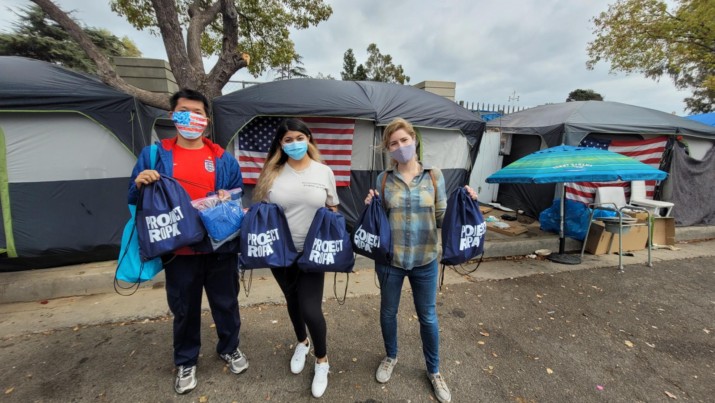
by Cameron Jackson | Jul 13, 2021 | General, News
Los Angeles, CA. Project Ropa continues to address the growing number of homeless people. Its mission is to restore dignity to those experiencing homelessness and empower them through providing clean clothes, hygiene kits, and employment opportunities. The non-profit offers a mobile hygiene service, a closet on wheels, clean clothes to avoid the spread of disease, and help people get jobs. Project Ropa hires individuals transitioning out of homelessness to help break the cycle of homelessness. The organization also helps reduce textile waste through its clothing recycling program and environmentally conscious management.
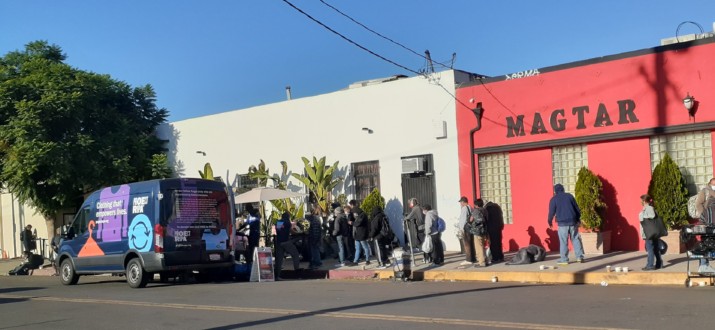
People line up for Project Ropa’s mobile hygiene service at St. Francis Center.
A report by the Economic Roundtable estimates that the number of people experiencing homelessness in Los Angeles will increase by 86% over the next two years.To combat this, Project Ropa hopes to create new site locations in low-income areas where most people are in danger of becoming homeless. However, as places reopen and more people return to work, Project Ropa has experienced a decline in volunteers and donations.
When COVID-19 first hit, Project Ropa was forced to shut down for six weeks. During this time administrators reassessed how to do business and best serve people with the new safety restrictions put in place. As public facilities shut down, many homeless individuals lost access to showers, meal stations, and clean drinking water. Hygiene, especially given the pandemic, is very important to avoid the spread of disease. To address these health issues, Project Ropa upgraded its hygiene kits to include sanitizer and masks, and they partnered with other nonprofits to offer showers and meal services.
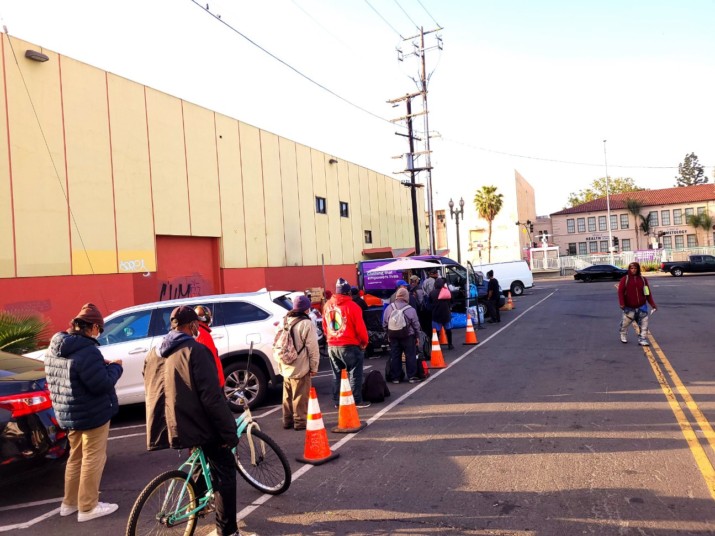
Project Ropa continues its services under COVID restrictions, making sure everyone stays 6 feet apart.
As safety restrictions limit the amount of people Project Ropa can service at once, it has allowed them to offer an even more personalized experience to people. Before the pandemic, Project Ropa emphasized spending time with each person and getting to know them, but the restrictions have allowed staff and volunteers to really interact and bond with those they are helping.
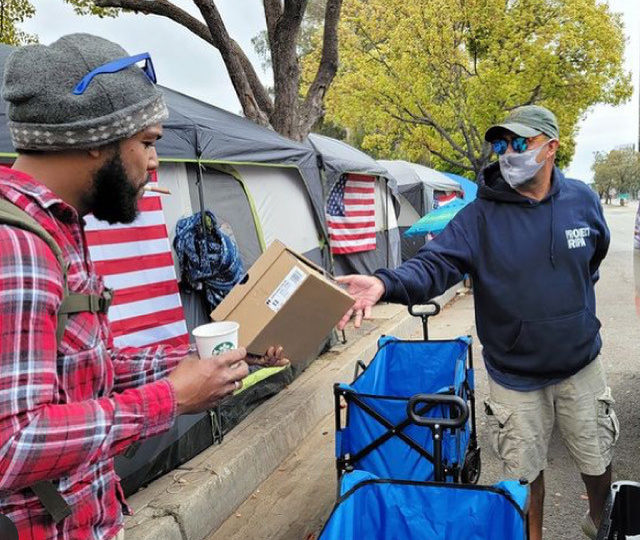
Volunteers distribute clothes and shoes on Veterans Row.
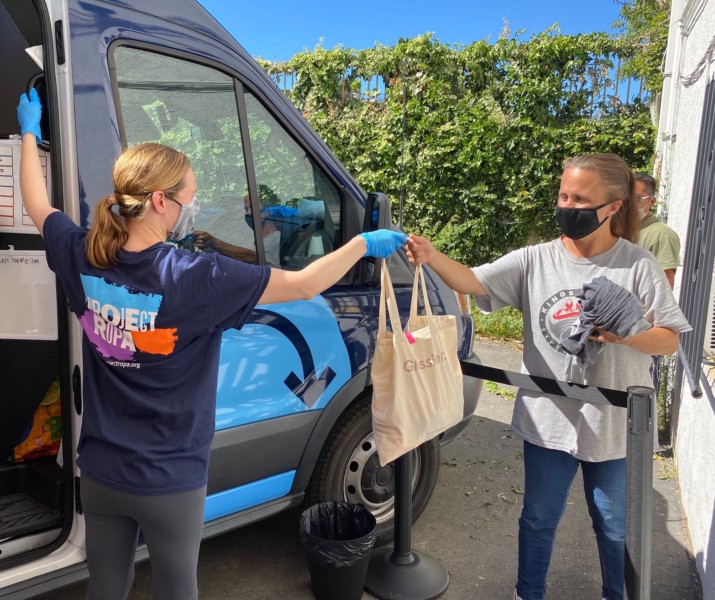
Project Ropa was founded in 2016 to address the challenges that homeless people face in obtaining and keeping clean clothes.
Project Ropa is made possible through volunteers and generous donations. Visit their website to find out how to help Project Ropa in their mission to help the homeless get back on their feet!
From Project Ropa:
Project Ropa is the only nonprofit organization of its kind in Los Angeles: our mission is to restore dignity and empower the lives of people experiencing homelessness in Los Angeles by providing clean clothes, hygiene essentials, and employment opportunities while reducing textile waste and minimizing our carbon footprint. Our retrofitted van, functioning as a mobile walk-in closet, carries hope as well as a full selection of clothes, shoes, accessories and hygiene products. To further our mission and help break the cycle of homelessness, we provide transitional job opportunities to people with barriers to employment, including homeless and previously incarcerated individuals.
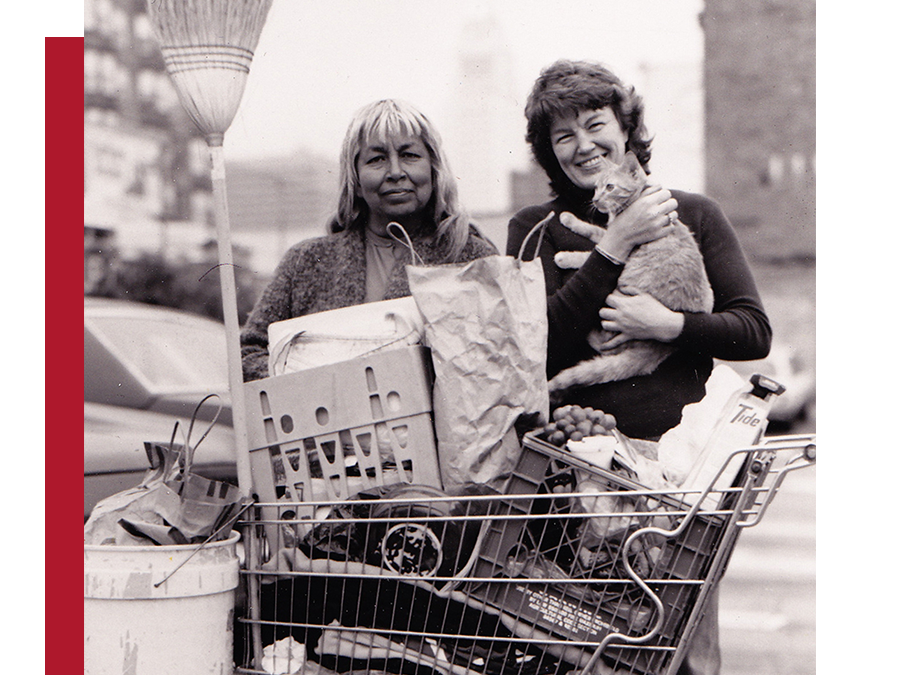
by Yasmin Vieira | Oct 30, 2020 | Feature, General, News |
Los Angeles, CA. Over the last forty years, The Downtown Women’s Center (DWC) has helped nearly 110,000 disadvantaged women with meals and housing. DWC was launched in 1978 because of the friendship between two women; Jill Halverson (pictured on the right above) created the nonprofit to help an inspiring homeless woman, and friend named Rosa (pictured above on the left). During the four decades that followed, DWC has grown into a nonprofit providing many vital services to disadvantaged women. DWC is the only organization in Los Angeles focused exclusively on serving and empowering women experiencing homelessness and formerly homeless women.
DWC representative Anita Vukovic says it’s hard to keep up with all the need, especially during a pandemic. “A lot of DWC work had to change due to consideration of social distancing measures, our community is especially vulnerable to COVID-19 due to underlying health conditions that many women experience. Our community is usually 55 years old and older,” Vukovic explained. DWC is able to provide more than 800 meals a day and offer on-site services in its parking lot, which enables social distancing. “Our health clinic also continues to operate Tuesday to Friday.”

Today, DWC manages 119 units of permanent housing across greater Los Angeles (like the apartment seen above) and has grown to serve more than 5,400 women annually.
DWC was recently selected as one of the 2020 California Nonprofit of the Year by California Senator Holly Mitchell of the 30th Senate District. DWC is one of over a hundred other nonprofits that will be honored by their state senators and assembly members for their contributions. State leaders want to honor DWC staff and volunteers, because they provide women with access to basic needs and resources, housing assistance, trauma-informed case management, mental and physical healthcare, job readiness and workforce development, and advocacy training and resources. “As our services expand to meet the community’s growing needs under COVID-19, we are deeply humbled to be recognized as a 2020 Nonprofit of the Year,” said DWC Chief Executive Officer Amy Turk. “DWC’s decades-long relationship with Senator Mitchell has always been a special one, and we are thrilled to continue working with her to bring greater visibility and resources to women experiencing homelessness in Los Angeles and across California.”
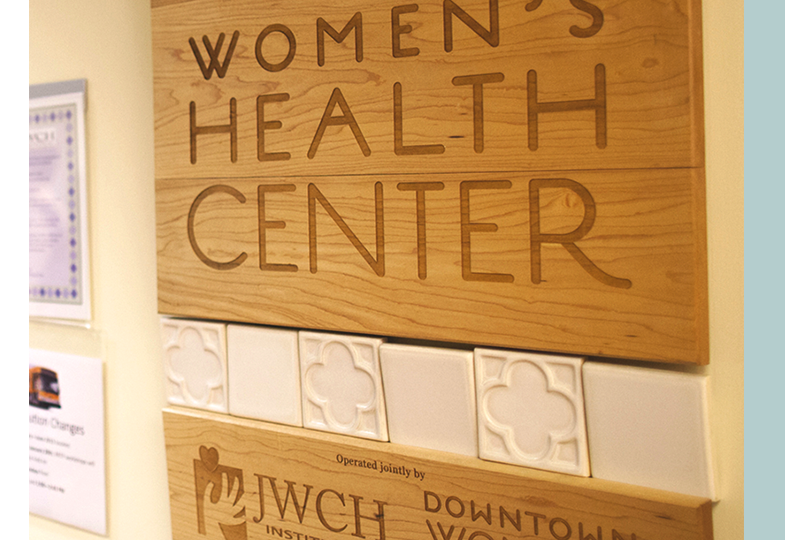
Women’s Health Center Clinic, DWC.

The Covid-19 pandemic has also made it difficult for DWC to use outside helpers.
“Volunteers have been the heart of our community in everything we do and how we are able to serve women,” says, Vukovic. DWC is still looking for opportunities to get their volunteers together. In September DWC had a three-week virtual campaign. “We saw a lot of positive feedback and engagement with that, people were really excited to be able to engage. We are looking into actually continue with that into the future.”
From Women’s Health Center:
How can you be informed on Housing First and Trauma-Informed:
- Access to basic needs and resources through our Day Center, where women can receive three daily meals and access to showers, restrooms, mail, laundry, and telephones.
- On-site housing and supportive services, with our 119 units of permanent housing across two residences making us one of the largest housing providers for women in the country.
- Community-based housing services, provided in partnership with the Los Angeles County Department of Health Services, the Los Angeles Homeless Services Authority (LAHSA), the Governor’s Office of Emergency Services, and various private foundations and corporations.
- Health and wellness services, including individual and group counseling, medical care, mental health services, preventive screenings, Trauma Recovery Center services, and enrichment activities.
- Job readiness and employment training, as well as job placement services and transitional jobs at MADE by DWC, in partnership with LA:RISE.
- Advocacy training, to empower women to become successful advocates for themselves and others by participating in press interviews, public policy meetings, lobby visits with legislators, fundraising events, press conferences, and more.
- Public education and volunteering, with a volunteer program that engages over 5,000 individuals annually.
- Research and evaluation, to continue to push the envelope on creative solutions to ending homelessness by providing real-time data on needs and impacts (see the DWC 2019 Los Angeles City Women’s Needs Assessment here).
We envision a Los Angeles with every woman housed and on a path to personal stability. Our mission is to end homelessness for women in greater Los Angeles through housing, wellness, and advocacy.













